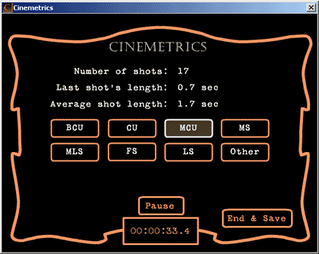
Monday, October 9, 2006
Before I had a chance to post anything about The Departed here on my own blog, controversy was aroused over at Tativille, where a nice bunch of us typed our opinions and debased one another's thoughts, or at least tried to. Because I am exhausted on the subject there'll be no formal post on my end here. But for anyone who is interested, and who isn't already one of the participating members of the debate, I refer to you to Tativille.
I have a few additions to my ideas on The Departed, most of them concerning the Bordwell reference on shot length, a quantifying process still in its scientific infancy. It's an intriguing idea and practice, that of counting each individual shot within a film, but at this stage of the study it's hard to make heads or tails of the research results--at least as far as I understand it. I understand it through Matt Hauske, who is working directly with the University of Chicago's Yuri Tsivian who pioneered Cinemetrics (That's the formal name for counting shot length, or technically, average shot length [ASL]. Hauske, my dear, please fill in the gaps and correct any mistakes I may have made in my 'Metrics jargon usage. And yes, I'm authoring the diminutive of Cinemetrics now, 'Metrics. Copyright that.)

The issue with relying on ASL (at least at this point) to deconstruct a film is two-fold. First, the process does not qualify any shot with description of its content (e.g. mise-en-scene, camera angle, lighting), and the numbers themselves are misleading (e.g. one shot may be 2 minutes in length, the next 2 seconds; take the average of that and it is likely a much different aesthetic than what was produced in the actual film.) If Scorsese's film, then, is deemed "pornographic" in its violence, based solely on the number 2.7, the ASL as noted by Bordwell, we don't actually have a film that flipped by so fast that our brains didn't process the images; the grotesque imagery did not (entirely) come in flashes of 2.7 seconds. I stand by my original example of the scene where Martin Sheen's character plunges to the ground from a high-rise. If memory serves, the freefall is significantly longer than 2.7 seconds, and his final crash to the asphalt gives us a moment of pause among the gore, and grief shown on DiCaprio's face.
I'm not an expert on this ASL/Cinemetrics stuff, but I did want to point out some of the problems with it, despite my own respect and curiosity for the study.
Hauske should enlighten us, and also, he has a Cinemetrics t-shirt.
No comments:
Post a Comment